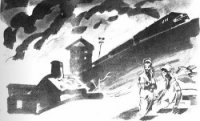A Death In The Family - Agee James (электронные книги без регистрации .TXT) 📗
But they saw it too. They sure saw it too. So he didn't, he wouldn't tell them, there wouldn't be anything to tell. That's it. He told me because I wasn't there and he wanted to tell somebody and thought I would want to know and I do. But not if he hates them. And he does. He hates them just like opening a furnace door but he doesn't want them to know it. He doesn't want them to know it because he doesn't want to hurt their feelings. He doesn't want them to know it because he knows they love him and think he loves them. He doesn't want them to know it because he loves them. But how can he love them if he hates them so? How can he hate them if he loves them? Is he mad at them because they can say their prayers and he doesn't? He could if he wanted to, why doesn't he? Because he hates prayers. And them too for saying them.
He wished he could ask his uncle, "Why do you hate Mama?" but he was afraid to. While he thought he looked now across the devastated Fort, and again into his uncle's face, and wished that he could ask. But he did not ask, and his uncle did not speak except to say, after a few minutes, "It's time to go home," and all the way home they walked in silence.
About the Author
James Agee was a writer with a precise and original talent, who was essentially a poet. This characteristic, in addition to his collection of poetry, Permit Me Voyage, appears clearly in his prose, Let Us Now Praise Famous Men and The Morning Watch. It also gave a clear, artistic quality to his outstanding screen plays, among them "The Quiet One" and "The African Queen" and a yet to be produced screen biography of Gauguin which has been called a revolutionary approach to the film. Millions saw his superb film biography, "Mr. Lincoln," which was repeated three times on Omnibus over ABC Television.
Agee was born in Knoxville, Tennessee. He went to St. Andrew's School, which was the background for The Morning Watch. After his family moved to Maine, he continued his studies at Exeter. While at Harvard he was editor of the Advocate. An assignment from Fortune Magazine led to the writing of Let Us Now Praise Famous Men. During the last years of his life, he worked primarily in Hollywood, almost exclusively with John Huston and Charles Laughton.
His death of a heart attack in New York on May 16, 1955, at the age of forty-five, ended the career of a unique writer.




